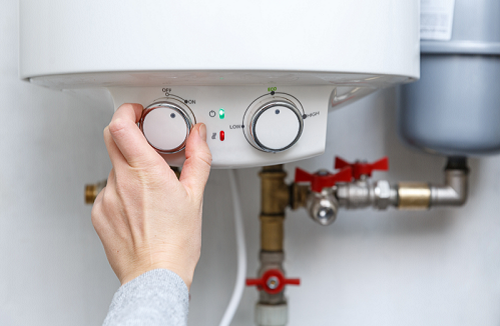As the name suggests, an electric water heater is an appliance that uses electricity — instead of fuels such as natural gas, oil, or propane — to heat water for domestic needs. If you are not familiar with the inner workings of these appliances, you may have some questions. For instance, do electric water heaters need to be vented? This article covers everything you need to know about electric tankless water heater venting.
Why Do Water Heaters Need Venting?
Traditional tank-style and tankless water heaters burn fuels such as natural gas, oil, or propane to heat water throughout a home. Fuel combustion creates emissions, primarily carbon dioxide, carbon monoxide, and water vapor.
These emissions can lead to many problems if they are allowed to linger in your home. Carbon dioxide, carbon monoxide, and other gases emitted from fuel combustion can cause serious health issues. The accumulation of water vapor can increase combustion pressure, potentially causing an explosion.
Venting a hot water heater provides an opening through which these dangerous emissions can escape. A vent is typically a pipe that goes through your roof or wall and flows out harmful gasses. Proper venting allows your water heating apparatus to eliminate dangerous gases and draw fresh air inside safely.
Types Of Water Heater Vents
There are many types of water heater vents you can install in your home. The chimney vent is the most common. As the name suggests, a chimney vent uses the home’s existing chimney to vent the emissions.
However, a chimney is not necessary to vent your water heater. If you are thinking about how to vent a hot water heater without a chimney, there are a few ways to go about it. These include:
- Direct Vent. A direct vent relies on a hole near the water heater for ventilation and air intake. Ideally, you should install a direct vent right near the water heater. Since direct vents are installed horizontally, they have fans to facilitate proper ventilation.
- Power Vent. If your home has proper airflow, you might want to consider a power vent. These use indoor air to vent out the gases from the water heater, using a powerful mechanical fan to pull air from inside the room.
Do All Types of Water Heaters Need Venting?
Electric water heaters are becoming increasingly common in US households for a good reason. An electric water heater offers an efficient way to heat water for bathing, washing, cooking, and other domestic uses. Does an electric tankless water heater need to be vented?
Unlike traditional water heaters, electric water heaters do not burn fuel to heat water. Therefore, electric water heaters don’t create emissions or by-products of combustion, such as carbon monoxide. For this reason, they don’t require ventilation.
How An Electric Water Heater Works
An electric water heater doesn’t need to be vented because it doesn’t produce any harmful gases due to fuel burning. That’s one of the biggest considerations for homeowners when it comes to electric vs gas water heater.
With a gas water heater, a gas burner is the heating mechanism. On the other hand, an electric water heater uses electric power with a heating element within the tank to heat the water. The hot water rises in the tank and flows to different parts of your home through the heat-out pipe.
Do Heat Pump Water Heaters Need to Be Vented?
Like an electric water heater, a heat pump water heater uses electricity. The critical difference is that a heat pump water heater, unlike a standard electric water heater, doesn’t generate heat directly. Instead, it just moves existing heat around.
A heat pump water heater draws air from the surroundings using electricity and circulates it through a pump, raising its temperature. It then dumps the hot air into the water tank, ultimately transferring the heat into the water.
Do heat pump water heaters need to be vented? The room housing a heat pump water heater must be large enough to absorb the cold exhaust air. Otherwise, the heater should be vented to eliminate the cold air.
Safety Considerations
When it comes to water heaters, safety is one of the most important considerations. Gas water heaters produce emissions such as carbon monoxide. Venting your gas water heater is necessary to prevent the build-up of combustible gases.
On the other hand, electric water heaters use electricity to heat water. Heating water using an electric heating element doesn’t produce harmful emissions. Therefore, your electric tankless water heater doesn’t need venting.
So, Do Electric Water Heaters Need to Be Vented
The simple answer is NO! As a homeowner, it’s imperative that you research the specific type of water heater installed in your home. This will help you determine whether venting is necessary to ensure safe operation. You don’t need to worry about installing a vent if it’s an electric model.


